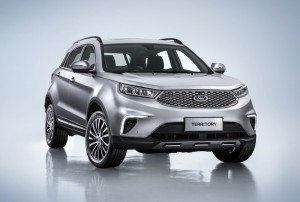
Ford's new entry-level sport-utility, the Territory, is the first of a wave of 50 new or redesigned products coming to China between now and 2025.
Ford Motor Co. has been perpetually behind when it comes to selling vehicles in China. Last year’s results were bad and with 2018 shaping up to be worse, the automaker is looking to move into new territory in 2019 with its new Territory SUV.
The entry-level ute is the first in a slew of new products the automaker expects will cut its double-digit monthly sales losses. In all, the company plans to introduce 50 new or redesigned vehicles in China between now and 2025.
The SUV, which is expected to be start at just under $22K, is part of an extremely popular segment in China. It’s a segment in which Ford has been a nonfactor until now.
“The Territory is a breakthrough for Ford in China in terms of our ability to successfully compete with Chinese automakers for millions of customers that we do not currently serve,” said Peter Fleet, president, Asia Pacific and chairman & CEO, Ford China, in a statement.
“Territory is a key proof point for how we will grow in China. We brought Territory to market with speed, high quality and cost efficiency. It will be affordable for young families and new buyers across China, not just the coastal mega-cities. And the technology will delight customers.”
(Ford Q2 earnings hurt by down sales in China. Click Here for the story.)

All-new Territory is equipped with Ford's infotainment system with an intuitive voice-command function, as well as a FordPass Connect embedded modem.
The new vehicle is produced in partnership with Jiangling Motors Corp. Ford’s relationship with local automaker JMC is important for a few reasons. First and foremost, the Chinese government requires it, and secondly, it acts as the eyes and ears for Ford.
JMC is familiar with the wants, needs and desires of the Chinese buyer whereas Ford’s expertise lies more in its ability to mass produce vehicles at a low price, incorporating the specific wants of the Chinese consumer into that program.
This helps Ford immensely as it is competing not only with other American other foreign companies to gain favor with the Chinese buyer, but also local indigenous players like Geely and Great Wall Motor, which produce competitive products. The all-new SUV will be manufactured at JMC’s Xiao Lan plant.
Territory customers can choose between a 48-volt mild hybrid with Miller-Cycle technology and a plug-in hybrid powertrain. It also will offer Ford’s infotainment system with intuitive Mandarin voice-command function, Co-Pilot360 suite of driver assistance technologies, incorporating features such as Adaptive Cruise Control and FordPass Connect with embedded modem.
(Click Here or more about Ford’s ongoing sales issues in China.)
The new ute is the company’s first option in this fast-growing segment in China, which is dominated by local automakers, and starts to solve some of the problems the company faces with gaps in Ford’s product line-up.

Chinese customers will be able to enjoy a smart and roomy Ford SUV instilled with Ford design DNA, at an affordable price.
“Clearly this’s been a difficult year for Ford in China. But this new vehicle is part of our growth plan that will improve our business in China and return us to profitability and set us on a growth trajectory again in China,” Fleet told Reuters.
“This isn’t going to be an instantaneous turnaround of our business in China, but you’re going to see a series of actions, a series of products and a series of moves that will return us to being a very successful growth business in China.”
Ford’s China slump intensified, as vehicle sales tumbled 38% in June and the automaker recorded its worst-ever first half. Ford sold 62,057 vehicles in China in June, taking its sales for the first half of the year to 400,443, down 25% compared with the year-ago period.
(To see more about Lincoln’s plans for five new models in China, Click Here.)
According to consultancy LMC Automotive, it was Ford’s biggest first-half percentage decline since starting operations in China in 2001. Ford, which undertook a big expansion in China earlier this decade, is paying the price for a lack of new models in its line-up. Last year, its sales fell 6% even as overall vehicle sales in China rose 3%.
